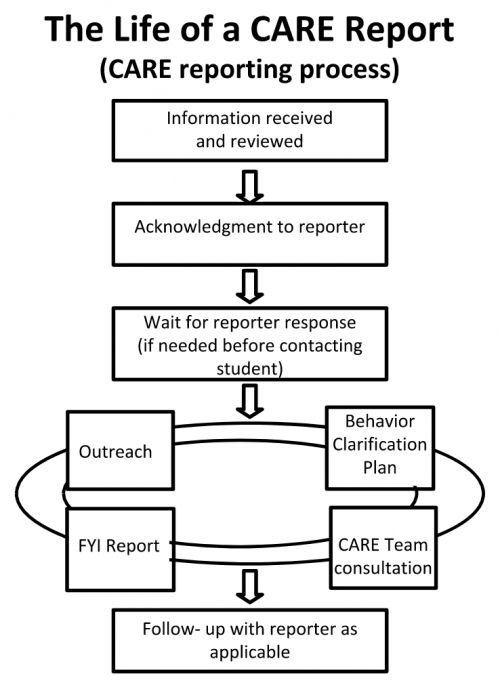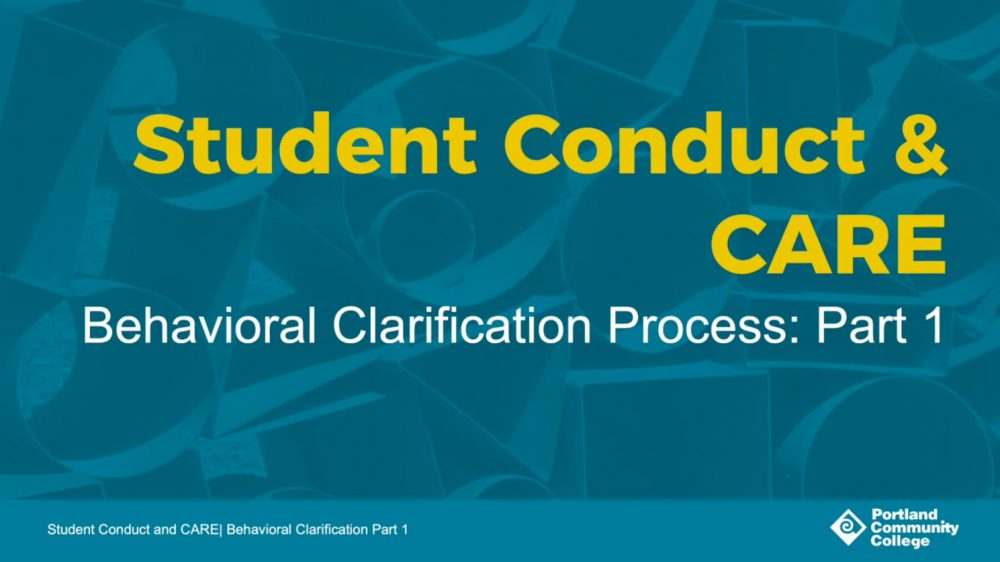CARE for faculty and staff
Resources
- Tips for online teaching and classroom management
- Student Life
- Counseling
- Employee Assistance Program
Ways to communicate CARE and concern
We encourage you to address your concerns with the student in question prior to submitting a CARE referral. We are, however, aware this is not always possible or your preference. By speaking directly with the student about your concerns it lets the student know that you care about the student’s success and there are resources available. Talking with the student about submitting a CARE referral also:
- Engages the student in their own process. The student is more likely to engage with an outreach (if appropriate).
- Connects the student with college professionals who can help provide options and/or resources moving forward.
- Provides context for the student as to why our office is reaching out to them to offer support.
Email correspondence
PCC uses pcc.edu accounts as official college communication. You are welcome to use this wording when responding to a student and edit it in a way that sounds authentic to you as an individual.
- Thank you for sharing with me. It sounds like you are going through a difficult experience. I want to do what I can to make sure PCC supports you, so I have asked someone in the office of Student Support and Intervention to reach out to you. You can expect someone to contact you soon. You also are welcome to reach out to their office at conductandcare@pcc.edu. Please let me know if you have any questions or concerns.
- Thank you for reaching out and sharing with me how you are feeling. I am concerned for your safety and I will need to submit a referral to the office at PCC that provides support and connection to resources. Someone from that office will be reaching out to you. I would encourage you to use one of the resources below:
- Multnomah County Crisis Line: 503-988-4888 (anyone can call, not just those in Multnomah County)
- National Suicide Prevention Lifeline: 1-800-273-8255
- Crisis Text Line: Text HOME to 741741
- PCC Counseling Centers
- Washington County Crisis Line: 503-291-9111
Note: If using the above language, please remember to submit a referral to our team if you have not done so yet.
Conversation starters
You may have the opportunity to talk to the student about your concern and want to connect to the CARE referral. Here are some ways to potentially start that conversation:
- Thank you for meeting with me today. I am concerned about what you (i.e. shared in class, wrote in a paper, wrote in a discussion post, etc.) and I would like to connect you with someone in CARE to offer you support or connection to resources.
- I have noticed that you are not participating (in class, not turning in homework, did poorly on your exams, etc.) and I would like to connect you with someone in CARE to offer you support or connection to resources.
- Thank you for sharing with me how you are feeling. I am concerned about your safety and I need to submit a CARE referral. Someone from their office will be reaching out to check on you. In the meantime, I would like to provide you with resources you could consider using. I can send those to your PCC email. (See the above “email correspondence” section for a template of language.)
Questions to consider before submitting a CARE referral
These questions are meant to serve as guidelines for referring a student to CARE.
Please note that the Office of Student Support and Intervention operates during normal business hours (8am to 5pm), and does not provide immediate crisis response. If you have a concern about a student that you believe requires immediate attention, please contact Public Safety at 971-722-4902 or in an emergency Public Safety can be reached at 971-722-4444.
You are encouraged to submit a CARE referral if you are uncertain about whether or not it is appropriate to do so, as your information can provide the “missing piece” to ensuring that a student is connected to support.
Here are some examples of reasons to submit a CARE referral (these are not all encompassing):
- Expresses significant personal or family problems in conversation, emails, or assignment.
- Creating a disruption in the class or work environment.
- Has experienced a death or significant illness of a family member or friend.
- Has been hospitalized, injured, or is experiencing a significant illness.
- Has indicated resource insecurity affecting access to housing, food, academic books or supplies, or any other basic needs.
- Has been absent for several class periods with no communication.
- Overuse of communication tools and instructor time.
- Discloses recent and/or current thoughts or actions of self-harm.
- Has a noted decline or change in academic progress or participation.
- In general, we will always encourage you to submit a CARE referral.
If you are still uncertain about whether to submit a CARE referral, please contact our office at conductandcare@pcc.edu.
The Life of a CARE referral
 Printable Life of a CARE referral.
Printable Life of a CARE referral.
- Information received and reviewed.
- Acknowledgement to referrer.
- Wait for referrer response (if needed before contacting student).
- The following happen in a loop:
- Outreach
- FYI referral
- Behavior Clarification Plan
- CARE team consultation
- Follow-up with referrer as applicable.
Syllabus wording
At PCC, we have a team of professionals who are dedicated to your overall well-being and your academic success. As your faculty, I may submit a CARE referral to make sure that you have wrap-around support to be successful here at PCC. You are also welcome to submit a CARE referral for yourself or others.
Contact info
For questions or to talk through a situation, please contact conductandcare@pcc.edu. If you are needing to complete a background check or a disciplinary check for transferring to another institution, please contact records@pcc.edu.

